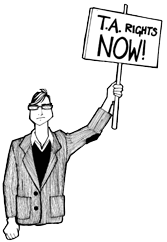Bill to Protect TA Unionization Introduced in Congress
 Yesterday, Sen. Ted Kennedy and Rep. George Miller introduced the "Teaching and Research Assistants Collective Bargaining Rights Act." This bill would amend the National Labor Relations Act to explicitly include Teaching and Research Assistants at private universities and colleges. From the press release:
Yesterday, Sen. Ted Kennedy and Rep. George Miller introduced the "Teaching and Research Assistants Collective Bargaining Rights Act." This bill would amend the National Labor Relations Act to explicitly include Teaching and Research Assistants at private universities and colleges. From the press release:
In fact, the classroom is a workplace for these scholars. It’s where they earn the money they need to pay to put food on their tables and a roof over their heads. They deserve the right to stand together and make their voice heard in their workplace. Like other employees, they should have the right to join a union and improve their working conditions. Obviously, better wages and working conditions for them also means better education for their students.
An NLRB That Needs Fixin'
The National Labor Relations Board was set up in 1935 to handle disputes between employees, unions, and management. After the 1947 passage of the Taft-Hartley Act (one of the most odious pieces of anti-labor legislation in this country's history) the NLRB has trended consistently more pro-management (to greater or lesser degrees) ever since.
That isn't to say that the rank-and-file NLRB employees aren't committed to the right to organize. I spent a summer interning at a Regional Office -- though by the time I was done I was effectively another Field Agent -- and the career employees were fantastic people, who really stood up as best they could for workers. However, as I saw first hand, it was like fighting with both hands behind your back, thanks to the restrictive decisions handed down by the actual Board itself: a five-member quasi-judicial body appointed by the President that hands down binding decisions regarding labor law. (There are actually three vacancies on the Board, which is a testament to the Bush Administration's penchant for letting regulatory agencies rot.)
Unionizing NYU
In 2000, the Board declared that NYU grad students should be protected under the NLRB:
Consistent with Supreme Court and Board precedent, we find that the graduate assistants are employees within the meaning of Section 2(3). We reject the contention of the Employer and several of the amici that, because the graduate assistants may be “predominately students,” they cannot be statutory employees. Like the Regional Director, we find there is no basis to deny collective-bargaining rights to statutory employees merely because they are employed by an educational institution in which they are enrolled as students. [Full text here]
As a result, NYU entered into a collective bargaining agreement with their graduate students' union. However in 2004, a Bush appointee-dominated Board reversed the decision, and in 2006 NYU refused to enter negotiations for a new contract. NYU students valiantly went on strike to force the University's hand, but in the end NYU won.
The Road Ahead
TA unionization is an important step on the road to student syndicalism -- student power can be felt acutely through the potential to halt the University's teaching capacity. A good law does not a labor movement make, as the labor movement has shown. For the working class, the legal right to unionize came only after they endured countless violent suppressions, murders, kidnappings, and assassinations. The brief history of TA labor is certainly less dramatic, but the basic formula is the same: if Kennedy's bill passes, it will be because of all the combined years of organizing, striking, and excellent students being suspended or expelled for standing up for their rights. Those who prefer to wait for the blessing of legality would have us all sit on our hands for eternity.
If the bill fails to pass, we will be where we are now: organizing to force universities to recognize TA and student unions. It's an important battle to wage: one that bears on the future of our movement, and the future of society itself.